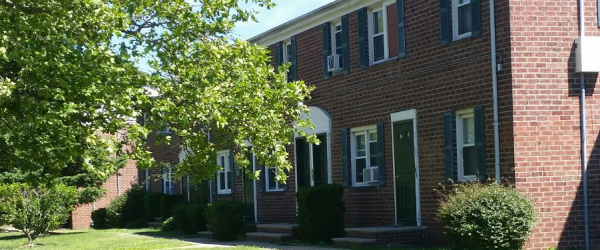Frederick Douglas Tenants File Civil Action Lawsuit
Claim: Unlawful Utility Cost Transfer Equates to $200 Monthly Increase
Tenants of the 90-unit Frederick Douglas Complex are fighting per month rent increases that equate to an estimated $200 per month.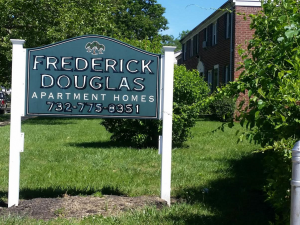
Built in 1971, the two-story complex is home to a large senior and low-to-moderate income population, many whom have called the Mattison Avenue located complex home for many decades.
The new lease agreements transfer the costs for heat, water, sewer and trash pickup to the tenants; doubles the late fee charge to $100; and mandates the purchase of personal liability [renters] insurance ‘in an amount not less than $100,’ according to a copy of the new lease.
But something about the new lease just did not sit right with 22-year- long resident Patricia Scott, who immediately launched a petition campaign. Scott began knocking on doors, speaking directly to each of her neighbors. If they weren’t home, she left a flier outlining her concerns.
“The new owners decided they were going to do new leases for everyone this month,” Scott [at right] said in a June interview at her one-bedroom home. “The new lease includes bed bug, lead, pet and utilities addendums and say we are now responsible for paying our heat, water, sewer and trash removal.”
The shift in utility costs put many of the residents in a tight spot, Scott said.
“Many of us are retired or on a fixed income,” she said. “This is an expense we really can’t afford. I understand that in condos and co-ops they pay that, but you know that from beginning. I’ve never heard of something like this at a complex like this.”
Scott maintains that the increase, based on a square-foot per unit formula, is unfair because it does not take into account how many people reside in a particular unit, thereby excluding actual usage. The homes’ utilities are not metered.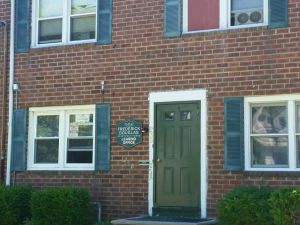
“The way they will calculate, because we do not have thermostats or water heaters in each apartment, will be based on cubic feet,” Scott said. “I have a one bedroom and I’m one person but there are people who have 2 and 3 people living in a one bedroom that may require more heat or more water.”
Soon a group of over 40 tenants were holding a meeting with Councilwoman Yvonne Clayton [shown below right], who put them in touch with South Jersey Legal Services [SJLS], a nonprofit that provides legal representation and advocacy to low-income individuals.
On Aug 8, Attorneys Olga D. Pomar and Justine Digeronimo of the SJLS Freehold office filed a civil action lawsuit on behalf of the tenants against their landlord – PF Asbury LLC, headquartered in Carrollton, Tx.
At the crux of the complaint is an opposition to the shift of utility costs, which Pomar and Digeronimo say unlawfully changes the terms of the tenants’ lease agreements.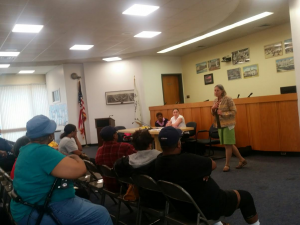
While Asbury Park does not have rent control laws in place, the lawyers maintain that the increase is above what state laws deem permissible.
“We are taking the position that they are not entitled to this [increase] for a couple of reasons,” Pomar said via a telephone interview. “There are regulations that the Department of Community Affairs has in place [with regard to the utility charges]. A landlord has to go through an approval process, which we don’t believed they have done.”
In seeking ‘a declaratory and injunctive relief,’ the attorneys say transferring heating, water and sewer costs is unlawful without the installation of meters. The per square footage rate formula does not take into account how many people live in a particular unit, the lawsuit reads.
“We are advising [the tenants] not to sign the section of the lease that requires them to pay the utilities. The combined effect of taking on the utility costs makes this a large increase. You are talking about a lot of tenants who are senior citizens.”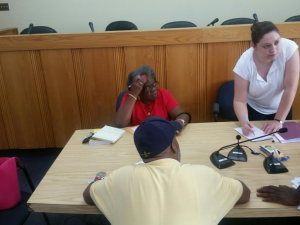
Pomar also said, while the building was once under HUD jurisdiction – allowing for the stabilization of rental increases, today they are left without protection. But provisions under the state’s landlord/tenant rental laws may be applicable.
“Attaching all these charges plus a rent increase, could make this unconscionable,” Pomar said.
The new charges, according to the lawsuit, are an estimated $70 to $160 monthly increase, aside from the mandatory renters insurance costs, which brings the tab to an estimated $200 increase.
In demanding renters insurance, the landlord is attempting to circumvent the state’s Security Deposit Act, which is intended to protect against property damage in an attempt to transfer normal operating costs on to the tenant, according to the lawsuit.
“Many of the tenants are on a fixed income,” Pomar said. “They can’t just start paying bills that they did not anticipate. They are being offered a lease that has an unspecified amount but normally you get a lease and you can say I can afford to pay this or can’t afford to pay this.”
Five of the complainants signed the new lease agreement in fear of eviction, and two signed the agreement but wrote their objections to proposed increases. The remainder did not sign the new lease in protest. They have continued to pay their rent [including an attached 2 to 3 percent rental rate increase, which equates to $25 to 30 per month].
Scott, a retired IAG employee who has lived at the property for 22 years, paid $921 per month for her 1 bedroom apartment. While her rent increased to $948, the additional per month utility costs would run her at close to an additional $150 per month, according to the lawsuit.
Calls and messages to PF Asbury LLC’s Newark office were not returned.
——————————————————————-
Follow the Asbury Park Sun on Facebook, Twitter and Instagram.
The Asbury Park Sun is affiliated with the triCityNews newspaper.

